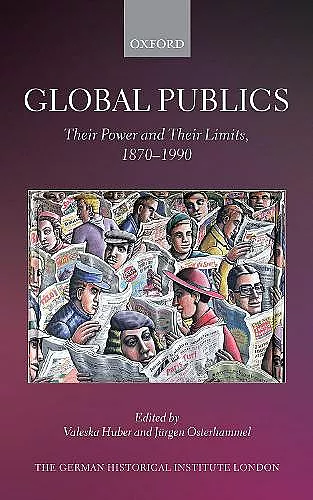Global Publics
Their Power and their Limits, 1870-1990
Jurgen Osterhammel editor Valeska Huber editor
Format:Hardback
Publisher:Oxford University Press
Published:28th May '20
Currently unavailable, and unfortunately no date known when it will be back

This volume combines a present-day and historical concern on the topic of global publics between the communication revolution of the 1870s and the digital age. Building on earlier theories of public spheres, Valeska Huber and Jürgen Osterhammel expand the notion of global publics not only geographically but also by charting new thematic territory, describing global publics as courts of global opinion, as market places, or as arenas for competition. As the first historical volume ever to combine different facets of global publics ranging from infrastructures, the press, film and theatre to human rights politics, it brings together established and emerging authors in the field of history and from related disciplines such as geography, sociology, and literature who explore how global publics were configured, imagined, and fragmented. In this way, Global Publics: Their Power and Their Limits not only provides a new conceptual framework and important case studies but also shows how histories of global communication might be studied in the future.
I could not do justice here to the manifold merits and nuances of this fascinating volume, which has set the stage for a new field of research on global publics both conceptually and methodologically. It constitutes an instant classic for specialists and students in political history, media history, and global history. * Betto van Waarden, Lund University, Connections *
It constitutes an instant classic for specialists and students in political history, media history, and global history * Betto van Waarden, Connections *
Global Publics is successful in stimulating conceptual discussion. Overall, the contributions make a strong case for using the notion of "global publics." Scholars working in the Habermasian tradition might be interested above all in Huber's and Osterhammel's introduction. Global historians may also want to turn to the essays: they present global publics as fractured and fragile, shaped by power structures and market forces, and only loosely coupled with visions of a global community or world citizenship. In particular, a focus on global publics seems to provide fresh perspectives for studying transnational forms of political mobilisation. * Christoph Streb, Hypotheses *
ISBN: 9780198865773
Dimensions: 222mm x 146mm x 28mm
Weight: 1g
423 pages